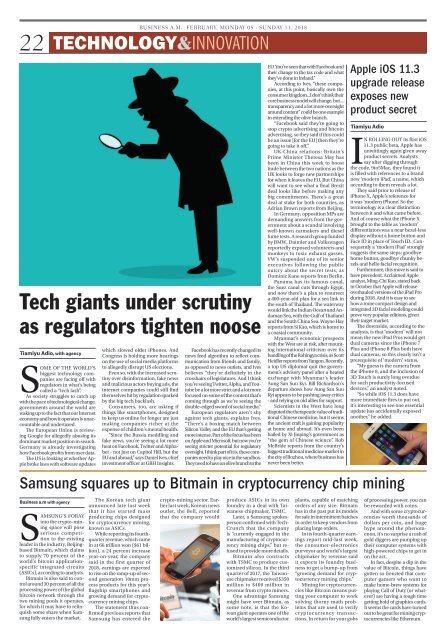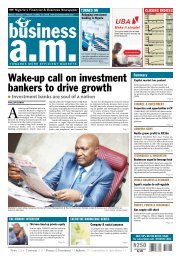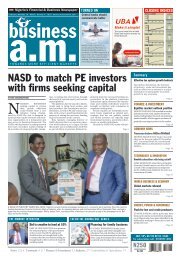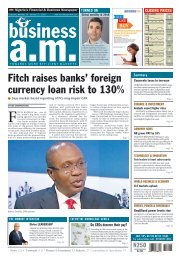You also want an ePaper? Increase the reach of your titles
YUMPU automatically turns print PDFs into web optimized ePapers that Google loves.
22<br />
<strong>BUSINESS</strong> A.M. <strong>FEB</strong>RUARY, MONDAY 05 - SUNDAY 11, <strong>2018</strong><br />
Tech giants under scrutiny<br />
as regulators tighten noose<br />
Tiamiyu Adio, with agency<br />
SOME OF THE WORLD’S<br />
biggest technology companies<br />
are facing off with<br />
regulators in what’s being<br />
called a “tech lash”.<br />
As society struggles to catch up<br />
with the pace of technological change,<br />
governments around the world are<br />
waking up to the fact that our Internet<br />
economy and how it operates is unaccountable<br />
and undertaxed.<br />
The European Union is reviewing<br />
Google for allegedly abusing its<br />
dominant market position in search.<br />
Germany is already investigating<br />
how Facebook profits from user data.<br />
The US is looking at whether Apple<br />
broke laws with software updates<br />
which slowed older iPhones. And<br />
Congress is holding more hearings<br />
on the use of social media platforms<br />
to allegedly disrupt US elections.<br />
Even so, with the increased scrutiny<br />
over disinformation, fake news<br />
and malicious actors buying ads, the<br />
internet companies could still find<br />
themselves hit by regulation sparked<br />
by the big tech backlash.<br />
Consumers, too, are asking if<br />
things like smartphones, designed<br />
to keep us online for longer are just<br />
making companies richer at the<br />
expense of children’s mental health.<br />
“Since the Russia meddling and<br />
fake news, you’re seeing a lot more<br />
heat on Facebook, Twitter and Alphabet<br />
- not just on Capitol Hill, but the<br />
EU and abroad,” says Daniel Ives, chief<br />
investment officer at GBH Insights.<br />
Samsung squares up to Bitmain in cryptocurrency chip mining<br />
Business a.m with agency<br />
S<strong>AM</strong>SUNG’S FORAY<br />
into the crypto-mining<br />
space will pose<br />
serious competition<br />
to the existing<br />
leader in the industry, Beijingbased<br />
Bitmain, which claims<br />
to supply 70 percent of the<br />
world’s bitcoin applicationspecific<br />
integrated circuits<br />
(ASICs), according to analysts.<br />
Bitmain is also said to control<br />
around 30 percent of all the<br />
processing power of the global<br />
bitcoin network through the<br />
two mining pools it operates,<br />
for which it may have to relinquish<br />
some share when Samsung<br />
fully enters the market.<br />
TECHNOLOGY&INNOVATION<br />
The Korean tech giant<br />
announced late last week<br />
that it has started mass<br />
producing chips designed<br />
for cryptocurrency mining,<br />
known as ASICs.<br />
While reporting its fourthquarter<br />
revenue, which came<br />
in at 66 trillion won ($61 billion),<br />
a 24 percent increase<br />
year-on-year, the company<br />
said in the first quarter of<br />
<strong>2018</strong>, earnings are expected<br />
to rise on the ramp-up of second<br />
generation 10mm process<br />
products for this year’s<br />
flagship smartphones and<br />
growing demand for cryptocurrency<br />
mining chips.<br />
The statement thus confirmed<br />
previous reports that<br />
Samsung has entered the<br />
Facebook has recently changed its<br />
news feed algorithm to reflect communication<br />
from friends and family,<br />
as opposed to news outlets, and Ives<br />
believes “they’re definitely in the<br />
crosshairs of legislatures. And I think<br />
you’re seeing Twitter, Alpha, and Youtube<br />
be a lot more strict and a lot more<br />
focused on some of the content that’s<br />
coming through as we’re seeing the<br />
double-edged sword of social media.”<br />
European regulators aren’t shy<br />
against tech giants, explains Ives.<br />
“There’s a boxing match between<br />
Silicon Valley and the EU that’s getting<br />
more intense. Part of the focus has been<br />
on Apple and Microsoft, but now you’re<br />
seeing stricter potential for regulatory<br />
oversight. I think part of it is, these companies<br />
need to play nice in the sandbox.<br />
They need to have an olive branch to the<br />
crypto-mining sector. Earlier<br />
last week, Korean news<br />
outlet, the Bell, reported<br />
that the company would<br />
produce ASICs in its own<br />
foundry in a deal with Taiwanese<br />
chipmaker, TSMC.<br />
Later, a Samsung spokesperson<br />
confirmed with Tech-<br />
Crunch that the company<br />
is “currently engaged in the<br />
manufacturing of cryptocurrency<br />
mining chips,” but refused<br />
to provide more details.<br />
Bitmain also contracts<br />
with TSMC to produce customized<br />
silicon. In the third<br />
quarter of 2017, the Taiwanese<br />
chipmaker received $350<br />
million to $400 million in<br />
revenue from crypto miners.<br />
One advantage Samsung<br />
might have over Bitmain, as<br />
some note, is that the Korean<br />
giant operates one of the<br />
world’s largest semiconductor<br />
EU. You’ve seen that with Facebook and<br />
their change to the tax code and what<br />
they’ve done in Ireland.”<br />
According to Ives, “these companies,<br />
at this point, basically own the<br />
consumer kingdom...I don’t think their<br />
core business model will change, but ...<br />
transparency and a lot more oversight<br />
around content” could be one example<br />
in extending the olive branch.<br />
“Facebook said they’re going to<br />
stop crypto advertising and bitcoin<br />
advertising, so they said if this could<br />
be an issue [for the EU] then they’re<br />
going to take it off.”<br />
UK-China relations: Britain’s<br />
Prime Minister Theresa May has<br />
been in China this week to boost<br />
trade between the two nations as the<br />
UK looks to forge new partnerships<br />
for when it leaves the EU. But China<br />
will want to see what a final Brexit<br />
deal looks like before making any<br />
big commitments. There’s a great<br />
deal at stake for both countries, as<br />
Adrian Brown reports from Beijing.<br />
In Germany, opposition MPs are<br />
demanding answers from the government<br />
about a scandal involving<br />
well-known carmakers and diesel<br />
fume tests. A research group funded<br />
by BMW, Daimler and Volkswagen<br />
reportedly exposed volunteers and<br />
monkeys to toxic exhaust gasses.<br />
VW’s suspended one of its senior<br />
executives following the public<br />
outcry about the secret tests, as<br />
Dominic Kane reports from Berlin.<br />
Panama has its famous canal,<br />
the Suez canal cuts through Egypt,<br />
and now there’s a plan to resurrect<br />
a 400-year-old plan for a sea link in<br />
the south of Thailand. The waterway<br />
would link the Indian Ocean and Andaman<br />
Sea, with the Gulf of Thailand<br />
and the South China Sea. Wayne Hay<br />
reports from Si Kao, which is home to<br />
a coastal community.<br />
Myanmar’s economic prospects<br />
with the West are at risk, after mounting<br />
international criticism over its<br />
handling of the Rohingya crisis, as Scott<br />
Heidler reports from Yangon. Recently,<br />
a top US diplomat quit the government’s<br />
advisory panel after a heated<br />
exchange with Myanmar’s leader<br />
Aung San Suu Kyi. Bill Richardson’s<br />
departure shows how Aung San Suu<br />
Kyi appears to be pushing away critics<br />
- and relying on old allies for support.<br />
Scientists in the West have long<br />
disputed the therapeutic value of traditional<br />
Chinese medicine, but it seems<br />
the ancient craft is gaining popularity<br />
at home and abroad. It’s even been<br />
hailed by Xi Jinping’s government as<br />
“the gem of Chinese science”. Rob<br />
McBride reports from the country’s<br />
biggest traditional medicine market in<br />
the city of Bozhou, where business has<br />
never been better.<br />
plants, capable of matching<br />
orders of any size. Bitmain<br />
has in the past put its models<br />
for sale in intermittent batches<br />
in order to keep vendors from<br />
placing large orders.<br />
In its fourth-quarter earnings<br />
report mid-last week,<br />
the consumer-electronics<br />
purveyor and world’s largest<br />
chipmaker by revenue said<br />
it expects its foundry business<br />
to get a bump-up from<br />
“growing demand for cryptocurrency<br />
mining chips.”<br />
Mining for cryptocurrencies<br />
like Bitcoin means putting<br />
your computer to work<br />
solving thorny math problems<br />
that are used to verify<br />
cryptocurrency transactions.<br />
In return for your gobs<br />
Apple iOS 11.3<br />
upgrade release<br />
exposes new<br />
product secret<br />
Tiamiyu Adio<br />
IN ROLLING OUT its first iOS<br />
11.3 public beta, Apple has<br />
unwittingly again given away<br />
product secrets. Analysts<br />
say after digging through<br />
the code, 9to5Mac, they found it<br />
is filled with references to a brand<br />
new ‘modern iPad’, a name, which<br />
according to them reveals a lot.<br />
They said prior to release of<br />
iPhone X, Apple’s reference for<br />
it was ‘modern iPhone’. So the<br />
terminology is a clear distinction<br />
between it and what came before.<br />
And of course what the iPhone X<br />
brought to the table as ‘modern’<br />
differentiators was a near bezel-less<br />
display without a home button and<br />
Face ID in place of Touch ID. Consequently<br />
a ‘modern iPad’ strongly<br />
suggests the same steps: goodbye<br />
home button, goodbye chunky bezels<br />
and hello facial recognition.<br />
Furthermore, this move is said to<br />
have precedent. Acclaimed Apple<br />
analyst, Ming-Chi Kuo, stated back<br />
in October that Apple will release<br />
overhauled versions of the iPad Pro<br />
during <strong>2018</strong>. And it is easy to see<br />
how a more compact design and<br />
integrated 3D facial modeling could<br />
prove very popular editions, given<br />
their target market.<br />
The downside, according to the<br />
analysts, is that ‘modern’ will not<br />
mean the new iPad Pros would get<br />
dual cameras since the iPhone 7<br />
Plus and iPhone 8 Plus both have<br />
dual cameras, so this clearly isn’t a<br />
prerequisite of ‘modern’ status.<br />
“My guess is the camera from<br />
the iPhone 8, and the inclusion of<br />
3D Touch is surely long overdue<br />
for such productivity-focused<br />
devices,” an analyst noted.<br />
“So while iOS 11.3 does have<br />
more immediate fires to put out,<br />
it’s interesting to see one essential<br />
update has accidentally exposed<br />
another,” he added.<br />
of processing power, you can<br />
be rewarded with coins.<br />
And with some cryptocurrencies<br />
worth thousands of<br />
dollars per coin, and huge<br />
hype around the phenomenon,<br />
it’s no surprise a rush of<br />
gold diggers are pumping up<br />
their computer systems with<br />
high-powered chips to get in<br />
on the act.<br />
In fact, despite a dip in the<br />
value of Bitcoin, things have<br />
gotten so frenzied that computer<br />
gamers who want to<br />
make home-brew systems for<br />
playing Call of Duty (or whatever)<br />
are having a tough time<br />
getting hold of graphics cards.<br />
It seems the cards have turned<br />
out to be great for mining cryptocurrencies<br />
like Ethereum.










